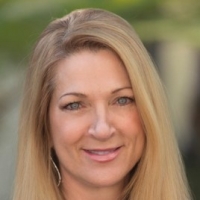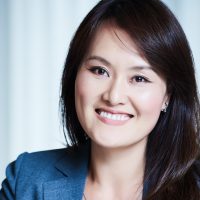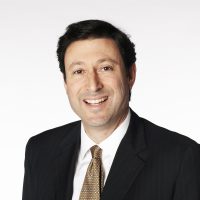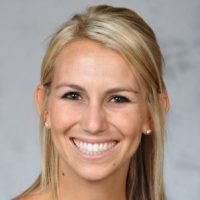Aaron Behle
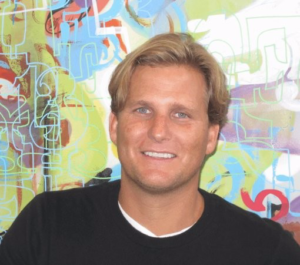
Aaron Behle
“Never pass up on a free meal” might sound like cheeky advice for a college student struggling to get by but for Aaron Behle it means something entirely different.
In fall of his Junior year in the UCLA Economics program, the family member of a friend who worked at Ernst and Young invited Aaron to a free steak dinner. Aaron took him up on the offer and was soon having dinner with a room of public accountants. “I honestly had no idea what public accounting was,” Aaron recalled with a laugh. “I had an amazing dinner with all these smart people and it was a great on-ramp for my career path.” That night ended up being a decisive moment for Aaron as he quickly started adding classes to his schedule for a minor in accounting. A year later, he interviewed for all six top accounting firms at the time and landed a job at Deloitte, as luck would have it, starting his first job post-graduation as a public accountant.
Aaron’s advice has nothing to do with saving on your groceries but instead to never pass up an opportunity when it comes your way. It seems for Aaron many of those opportunities have often come through meeting people, from launching his career in public accounting to ending up in international business years later. Even during his time at UCLA, Aaron says that it was the professors and connections he built through the Honors program that allowed him to gain a greater understanding of economics that would be the foundation of his career.
“I was fortunate enough with the teachers I had that presented with this great bridge between theory and reality and that to me was really important. They gave me this great toolbox of economic theory and equations and then actually taught me how to apply it to the real world.”
In fact, Aaron still remembers his Economics 1 professor, the emeritus chairman of the economics department at the time, William R. Allen. From his first economics class, Aaron built a relationship with Allen, and ultimately the chairman ended up playing a large part in his academic career. In Aaron’s senior year he wrote two papers with Allen, one of them focused on the rapidly transforming state and economy of South Africa which at the time was just leaving behind the system of apartheid. Nearly thirty years later, Aaron still stands by his research, saying “South Africa at that time was at the tipping point of apartheid and my position was that the injection of capital would accelerate free market capitalism, competition and opportunity; there is no room for racism in competitive markets.”
And remarkably, what Aaron learned truly followed him in building his career. In lieu of Aaron’s own advice on taking opportunities, Aaron was interviewing for a finance job when he was unexpectedly offered a position in business development for the global sports equipment and lifestyle brand Oakley. Oakley was expanding to international markets, and when, in a turn of events, Aaron was hired in the development department instead of finance, he ended up in none other than South Africa. Aaron narrated the incredible circumstance, “I graduate in 93, in 96 I’m in South Africa working for Oakley setting up a company!”
Speaking about the trajectory of his career, Aaron says, “There are no straight lines in nature and no straight lines in life, certainly in today’s market more than ever.” He believes that you may never know where you will end up years later, the best approach is to take the opportunities as they come your way. And that is exactly how after starting in public accounting, Aaron was launched into a successful career working with global consumer products brands including Oakley, Reef, Dragon, Skullcandy, and now, Salt Optics.
But when asked if he ever lost his economics knowledge, Aaron laughed, “It never leaves.” He remarked that every step of the way in his career in business, the economics he learned at UCLA was a relevant, key tool for him. On the importance of what he learned in the economics program, Aaron said, “Economics is like studying the organism of commerce… You would be very surprised at the practical application of what you learn.” In fact, he has seen economics concepts reflected in the international markets he has worked in: “Spending almost my 30 years with global businesses, I have seen economic theories play out via changes in political regimes, geopolitical conflict, trade sanctions, currency manipulation, trade agreements…the list is long”
In fact, with Aaron’s background as a student studying economics and now his accumulated years of experience working in international markets, he has come back to guest lecture in the economics department teaching courses in pricing theory and compensation. Now with his “immediate exposure to currency fluctuations and impact on pricing” that he gained from his work in global business, Aaron brings a new, practical perspective to the theory.
“When I do my pricing course I talk a lot about that. When you are involved in global markets where the currency is constantly in flux, we discuss how that impacts your sourcing strategy and how you price the product to the end consumer today, a month from now, six months from now and how you develop product and sourcing strategies with these pricing changes. A lot of that is what I learned first-hand in the context of economics.”
At the beginning of the discussion, Aaron said regarding his humble beginnings as an economics student that from the start “[he] was all in”, and that has stayed true even now. While Aaron has taken every great opportunity that came his way from an unexpected start in public accounting to launching his career in international business, Aaron has stayed true to his commitment to be a lifelong student of economics. He applied it to his career while the experience he gained allowed him to develop a greater understanding of the workings of “the organism of commerce.” Now Aaron’s beginnings in the UCLA economics department has come full circle as he teaches students the connection between theory and application that his professors once taught him. This is the definition of a true Bruin.
Written by Katia Arami, UCLA Undergraduate Student

